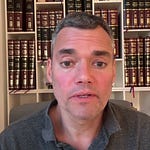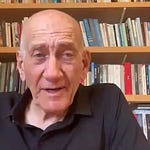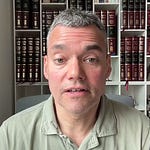Our Zoom call this week will be at the usual time: Friday at Noon EST.
Our guests will be two of America’s most insightful commentators on Israel-Palestine, and foreign policy more generally: Washington Post columnist Karen Attiah and Terrell Starr, author of the Black Diplomats newsletter on Substack. We’ll talk about the evolution of Black political discourse on Israel-Palestine and the way race structures debates over America’s role in the world.
Paid subscribers will get the link this Tuesday and the video the following week. They’ll also gain access to our library of past Zoom interviews with guests like Thomas Friedman, Ilhan Omar, Rashid Khalidi, Benny Morris, Noam Chomsky, and Bret Stephens.
Sources Cited in this Video
My essay in Jewish Currents about Harvard’s old antisemitism task force.
Harvard’s new antisemitism task force, co-chaired by Professor Derek Penslar.
Penslar’s book, Zionism: An Emotional State.
Abe Foxman and Bill Ackman attack Penslar.
Alan Dershowitz calls for disbanding Jewish Studies departments (14 minutes into the video).
Things to Read
(Maybe this should be obvious, but I link to articles and videos I find provocative and significant, not necessarily ones I entirely agree with.)
In Jewish Currents (subscribe!), Alex Kane and Jonathan Shamir explain the dangers of a regional war in the Middle East.
Joe Biden admits that US strikes against the Houthis in Yemen aren’t working—then says they’ll continue.
A Breaking the Silence explainer answering the claim that Israel left the Gaza Strip in 2005.
I’ll be speaking about Israel, Gaza and the debate about the war on campus at the Carr Center for Human Rights Policy at Harvard’s Kennedy School on January 25.
The night before my event, Harvard Medical School is sponsoring a symposium on the public health crisis in Gaza.
See you on Friday at Noon,
Peter
VIDEO TRANSCRIPTION:
Hi. There’s been a lot of talk of course about antisemitism since October 7th. And there has been, I think, clearly a rise of antisemitism, and I’ve talked about that before. But I also think that underneath this discussion of antisemitism are also dynamics among American Jews inside the American Jewish community that are sometimes obscured from view that the media doesn’t quite pick up on. And these are a kind of, I would say, an intra-Jewish civil war. The civil war is partly generational with younger American Jews often expressing views about Israel that are deemed antisemitic by major American Jewish organizations, for instance, boycotting Israel and not supporting Israel as a Jewish state. But there’s another divide, I think, kind of hidden divide, inside the American Jewish community that is often overlooked, that gets described in the language of antisemitism. And that’s a kind of a divide around class between different elements in the Jewish community that have different views about Israel and that are in different positions in terms of class. And I want to try to give an example of how this is playing itself out.
So, after October 7th, the president of Harvard University, then-president Claudine Gay, came under pressure to appoint a kind of a committee to look into antisemitism at the campus. Now, almost nobody on the committee had any scholarly credentials in the study of antisemitism. What it did have was a whole group of people who had either said that they believed that anti-Zionism was antisemitism, which would be to say that a lot of the pro-Palestinian activism at Harvard was therefore antisemitic, and people who had ties to the Anti-Defamation League, which has said that anti-Zionism is antisemitism. And that was a set of views that, although again none of these people really had scholarly credentials on this question, that made establishment American Jewish organizations happy, and made many of the donors who were upset at Harvard, it made them happy. And I wrote a column in Jewish Currents about the absurdity of the fact that Harvard and these other universities were creating committees to study antisemitism on their campuses, and often ignoring their own experts who studied antisemitism, and going to choose people instead for these committees whose qualifications that they had views that were similar to the views of donors who were upset by pro-Palestinian activism. So, for instance, the University of Pennsylvania, when they created an antisemitism commission, the person who they named to head the committee was the head of the dental school.
But interestingly, at Harvard, things have now taken a turn. So, Claudine Gay was essentially pushed out and now the interim president of Harvard has essentially scrapped that earlier antisemitism committee and created a new one. And its co-chair is a guy named Derek Penslar. Now, Derek Penslar runs Harvard Center for Jewish Studies. He’s a professor of Israel studies and he’s one of the world’s experts on both Zionism, anti-Zionism, and antisemitism. He recently wrote an acclaimed book called Zionism: an Emotional State, which actually has a whole chapter on the different motivations of people who have hated Zionism since its founding in the late 19th century, and the relationship between those different kinds of hostilities and antisemitism. So, essentially, he is kind of the perfect person, right, to co-chair a committee on antisemitism at Harvard because he’s a world’s expert not only on antisemitism but on the relationship between Zionism, anti-Zionism, and antisemitism.
So, what has happened? A furor has erupted in which big donors to Harvard like Bill Ackman and establishment Jewish organizations leaders like Abe Foxman who ran the Anti-Defamation League are furious that Penslar has been put in charge of this committee to study antisemitism because he’s a critic of Israel. His criticisms are not radical by any means. In fact, I think he’s very much in the mainstream of how scholars of antisemitism and scholars in Jewish studies tend to see Israel. Which is to say, it’s very, very mainstream for scholars of Jewish studies in the United States to be very critical of Israel and even to raise questions about Zionism itself. And the scholarly consensus among people who study antisemitism is generally that anti-Zionism is not antisemitism. So, the American Jewish establishment organizations and the Israeli government support a definition of antisemitism called the International Holocaust Remembrance Alliance definition of antisemitism, which essentially does gesture towards the idea that anti-Zionism is antisemitism. But while this has a lot of mainstream institutional support in the Jewish community, it doesn’t have very much support among scholars who actually study antisemitism. There are a bunch of scholars who’ve signed it, but if you look carefully, you’ll find that actually it doesn’t have very much support among scholars who actually study antisemitism and who study Israel-Palestine.
A competing definition, which is the one that Penslar has supported, which is called the Jerusalem Declaration, which doesn’t claim that anti-Zionism equals antisemitism, has much more support among scholars of Jewish studies and scholars of antisemitism. But the problem is that those scholars have a view that is very different than many of the large Jewish donors that are pressuring these universities and views that are very different from the establishment Jewish organizations. So, when a university responds to the question of antisemitism by drawing on the expertise of its own scholars of antisemitism rather than assuaging Jewish organizations and donors, it infuriates them. And this is because there is a kind of a class divide, you could say, among American Jews between a group of scholars who study these things whose views are really quite different in the main from the Jewish organizations and the donors. And it’s important to remember that very often it is large donors that dictate the perspectives of American Jewish organizations. So, there’s a kind of a class divide, you could almost say, that exists among American Jews in addition to this generational divide. And I would say it is between the kind of donor class—the donors to universities and a donor class that wields tremendous influence in organized American Jewish organizations—that wants to define anti-Zionism as antisemitism, and a kind of scholarly class—an intellectual class that you’d find actually doing Jewish studies at universities—that actually doesn’t generally believe that anti-Zion is antisemitism. And that’s the conflict you have now over the appointment of Derek Penslar.
It’s kind of a hilarious little footnote that Alan Dershowitz recently called for universities to disband their Jewish studies departments. Now, why would Alan Dershowitz call for universities to disband their Jewish departments? Presumably, he thinks that studying Judaism and Jewish history and Jewish culture is a good thing? No! He says we need to disband the Jewish studies departments because he believes that they’ve become hotbeds of antisemitism, right? Which is just his own way of saying these scholars who study Jewish history, who study Jewish studies, who study antisemitism, don’t actually come to the political conclusions that we would like. And that’s the situation that we’re facing now in this new little controversy around Derek Penslar’s appointment. And it’s another test for these universities, right? Are they gonna stand up for their own scholarly mission? Or are they gonna bow to pressure from donors and from outside groups who, although they’re speaking in the name of what they claim is good for Jews, right, or is in the interest of Jews, they’re actually in active opposition to empowering the very people who have spent their lives devoted to the scholarly study of antisemitism, like Derek Penslar. I hope to see many of you on our call this Friday and the information is in the email about our guests.










